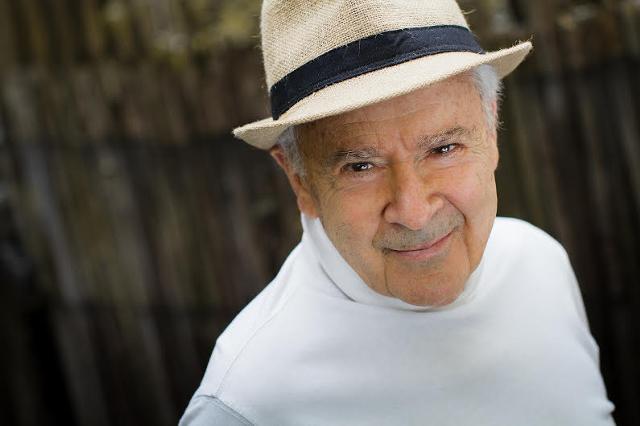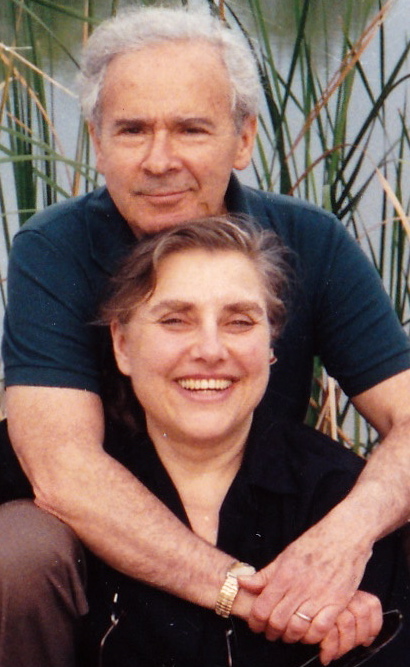 Today's interviewee reached out to me and suggested that I interview him. After taking a quick look at his bio I realized, "How could I not?" Here is how he introduced himself: "I turn 90 this year as an award-winning author, playwright, songwriter, and a journalist. I began my writing career as an author for legendary pop sensation Eddie Fisher, who sold millions of records. My late wife, Arlene, wrote the What To Expect When You're Expecting series. An extension of my wife's writing, I continue to publish in tribute from Arlene's inspiration." What a fascinating guy! Plus, he has a cool hat. You can read and learn a lot more about Howard at his website or check out his many books (he's written extensively on the topic of recovery, as well as lots of stuff for young readers) on Amazon.
Today's interviewee reached out to me and suggested that I interview him. After taking a quick look at his bio I realized, "How could I not?" Here is how he introduced himself: "I turn 90 this year as an award-winning author, playwright, songwriter, and a journalist. I began my writing career as an author for legendary pop sensation Eddie Fisher, who sold millions of records. My late wife, Arlene, wrote the What To Expect When You're Expecting series. An extension of my wife's writing, I continue to publish in tribute from Arlene's inspiration." What a fascinating guy! Plus, he has a cool hat. You can read and learn a lot more about Howard at his website or check out his many books (he's written extensively on the topic of recovery, as well as lots of stuff for young readers) on Amazon.
You're almost 90 and you're still writing. What era of your life did writing come the easiest to you/when was it the most pleasurable? When was it the most difficult?   Â
I've enjoyed (and occasionally suffered) the Writing Life for roughly (mostly smoothly) 71 years. It all started with writing The Company K Rifleman in the U.S. Army at age 18 in an SS barracks in Germany at the end of WWII. My company commander called me in. "Private Eisenberg," he said, "I see you've had a couple of years of college. The Krauts left in a hurry and left a mimeograph machine behind. Write me a company newspaper." I didn't know the first thing about journalism. But when I saw the smiles on my buddies' faces when they read that first issue I thought, "I want to do this for the rest of my life."
I read that your wife pursued you in part by getting clippings of your hair to send to Eddie Fisher's fans when his barber ran out of the real deal. What were some other unusual tasks you or Arlene needed to do as Fisher's publicist?
Eddie and I went to the same barber, so it made sense to fill fan requests for his black curly hair with a mix that included my own once black curly hair. It was that or have Eddie go onstage bald. Rudy the Barber swept it up and then 16-year-old Arlene (two years later to become my amazing wife) mailed it out to bring joy to teens and sub-teens from any of Eddie's thousands of fan clubs. There! After 60-some years, our secret is out, and I may as well confess the rest of our crimes. Eddie -- rehearsing, performing, traveling -- couldn't possibly sign all the requests for 8x10 glossy photos. Arlene was his official forger (she was good at it, too) with, "Luv you, Eddie!"
Do you have any great little-known gossipy or sweet stories about Fisher and Liz Taylor?
I left Eddie to go on to freelance magazine writing with Arlene shortly after Liz came into his life and became more important to him than his career. But I have a sweet story about his first wife, Debbie Reynolds. Frugal Debbie needed some new clothes when we stayed at their home in Beverly Hills for a few days. She asked Arlene to shop with her and in chic Rodeo Drive stores she whispered to her, "Would you look at the price tags for me, please. Stars aren't supposed to do that." Smiling, Arlene complied.
Who are your songwriting inspirations?    Â
The big ballad in my musical is "All I Ever Think About Is You." I wrote it with Arlene in mind, and its most important lines were, "So I accept this sound advice/ No love affair is worth the price/ And so/ You know/That all I'll ever think about is you." I had plenty of temptations. Almost all men do. But an affair just wouldn't have been worth losing Arlene -- the wife I called Wonder Woman and loved for 48 years. I still do.
You've been on this planet longer than most. My husband and I often discuss whether the world indeed gets worse over time or whether it just seems that way (for instance, at least we're not dealing with polio or the Cuban Missile Crisis.) What are your thoughts on where we are in terms of either progress or decline?    Â
That's a very long story and I have no desire to play pundit, but I think every generation has "the same fears, only different." The weapons have changed from spears and arrows to rockets and nuclear bombs, but all have wreaked havoc and created bloody hells. Our planet seems ready to revenge itself for the damage we've done to it. We're feeling that already with global warming and storming. There are some hopeful signs though. Let's hope they're not too late.
 What tips do you have on how to write with your spouse?    Â
What tips do you have on how to write with your spouse?    Â
During the years we wrote for Saturday Evening Post, Reader's Digest, Cosmopolitan, Parade, New York Times Magazine, Sports Illustrated and a bunch of others, we shared a Corona Electromatic portable that we called "our typewriter built for two." Of course we switched to separate computers when they came along -- which mercifully meant we didn't have to retype manuscripts any more. Mostly we wrote together, taking turns at polishing and editing one another. Sometimes she wrote most. Sometimes I did. Always the byline was "By Arlene and Howard Eisenberg."
Among other skills, Arlene was a great organizer. She proved that when she and [our daughter] Heidi collaborated on the first pregnancy book to do something so complicated that no previous author had tried to do it --tell moms what was happening month by month. To date,"What to Expect When You're Expecting" has become a 34 million copy best-seller in 30 languages, a considerable number thanks to Heidi, who took over completely when Arlene tragically left us 14 years ago.
Most parents know how to read with their kids: what worked for your family in terms of getting the children engaged with writing?
Writing seems to have come naturally to all three of our children. Living with writing parents certainly influenced them, just as living with artist or athlete families affects other kids. Evan has written two incredibly well-reviewed books and has sold a six-figure screenplay. Heidi's first effort, at 17 I think -- an article about her experiences at McDonald's one summer -- sold to the New York News Sunday Magazine, and she wouldn't let me change a word. That began what has become a career as co-author of the book that millions of women have come to call "my bible."
How did you get into writing about recovery?
I wrote a piece for a medical magazine about a Georgia doctor who had gone to prison for writing pain prescriptions for himself under false names. Later he opened what became one of the Top Ten best recovery hospitals in the country. (Personally, I think the best.) Willingway needed a book to give to patients when they left treatment -- to help them stay clean and sober. Arlene and I wrote it with Dr. Al Mooney, the founder's son. The Recovery Book (Workman) sold almost half a million copies and is now in its second edition.
What did you learn about motherhood or pregnancy through your experiences being related to the authors of the What to Expect books that most men aren't aware of?
I learned that things sure have changed. I loved going through red lights as we drove to the hospital for first child Sandee's birth. I kept hoping a police car would stop us so I could say, "My wife is having a baby!" and then follow that car with sirens blaring. That didn't happen, but my hospital experience was different from that of today's dads. In the 50s, fathers weren't part of the process. We were just supposed to sit in the waiting room and hand out cigars later. I did what I was expected to do. I missed a lot.
What make and brand is your hat?
I bought my hat from a pier vendor on a visit to Santa Monica a few years ago. Inside all it says is: $25...Made in China...100% hemp." It's not high fashion, but neither am I.
How does it feel to be the 419th person interviewed for Zulkey.com?
Honored.

Howard Eisenberg
I loved the questions you asked me, Claire. They pulled memories out of me that I'd forgotten and very much enjoyed reliving in the writing. Thanks a trillion.
Jennifer Zinn
What a wonderful interview. Mr. Eisenberg spoke so eloquently and seems to have had such an amazing life... I hope the coming years bring him more projects and happiness.